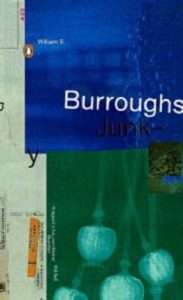 It was not my intention to read Junky, William S. Burroughs’ famous account of his heroin addiction and the ins and outs of the addict’s life, in tandem with Sam Quinones’ investigation into America’s present opioid crisis, Dreamland, but Burroughs’ book was in the front window of the last used bookstore I visited, and the serendipity of that proved too much to pass up. I should also mention that this was my first encounter with Burroughs, whose fame among the Beat-revering counterculturalists, the sort of people who could glamorize an all-consuming drug addiction, was justification enough for keeping my distance. Junky, I am happy to report, has overthrown my prejudices, at least as far as Burroughs is concerned, for he does for heroin addiction what Orwell did for the homeless and destitute in Down And Out In Paris And London: in clear prose and honest, unfiltered reporting, he makes us feel what it is like to live the addict’s life.
It was not my intention to read Junky, William S. Burroughs’ famous account of his heroin addiction and the ins and outs of the addict’s life, in tandem with Sam Quinones’ investigation into America’s present opioid crisis, Dreamland, but Burroughs’ book was in the front window of the last used bookstore I visited, and the serendipity of that proved too much to pass up. I should also mention that this was my first encounter with Burroughs, whose fame among the Beat-revering counterculturalists, the sort of people who could glamorize an all-consuming drug addiction, was justification enough for keeping my distance. Junky, I am happy to report, has overthrown my prejudices, at least as far as Burroughs is concerned, for he does for heroin addiction what Orwell did for the homeless and destitute in Down And Out In Paris And London: in clear prose and honest, unfiltered reporting, he makes us feel what it is like to live the addict’s life.
“Junk is not, like alcohol or weed, a means to increased enjoyment of life,” he tells us in the Prologue. “It is is a way of life.” The heroin high does not supplement a life well lived, or even provide a temporary respite from suffering; rather, it supplants all other concerns. You can use alcohol and weed, but heroin uses you. The majority of the drug dealers, Burroughs observes, are merely dealing to support their drug habit. Those that cannot afford to buy heroin wholesale, or who don’t have the self-restraint necessary to set aside some of their purchase for future resale, often resort to crime, and some of the most amusing passages in Junky recount the efforts of Burroughs and his partners in crime to relieve drunken New York subway passengers of their wallets. As a pusher as well as a user, Burroughs can relate the story from both sides, and one of the perils of selling heroin is that your market of dope fiends is constitutionally unreliable: they don’t usually work steady jobs, and if they do, they don’t do so for long; they’re liable to lie, steal or cheat to get their fix; and worst of all, the pains of withdrawal are severe enough that 48 hours in a police holding cell is enough to convince them to name their suppliers. Perhaps the most interesting question Burroughs raises is why people get hooked on heroin in the first place, given how steep a price the habit exacts.
Junk is a cellular equation that teaches the user facts of general validity. I have learned a great deal from using junk: I have seen life measured out in eyedroppers of morphine solution. I experienced the agonizing deprivation of junk sickness, and the pleasure of relief when junk-thirsty cells drank from the needle. Perhaps all pleasure is relief. I have learned the cellular stoicism that junk teaches the user. I have seen a cell full of sick junkies silent and immobile in separate misery. They knew the pointlessness of complaining or moving. They knew that basically no one can help anyone else. There is no key, no secret someone else has that he can give you.
T.S. Eliot’s Prufrock saw his life measured out in coffee spoons, but Burroughs has used morphine solution to number his days, and if junk is merely a cellular equation, it nonetheless might offer a profound lesson: that what we think of is pleasure is really only a temporary relief from pain.
The publication of this book allegedly made the addict’s lifestyle appealing to a younger generation of readers certain of nothing but their distaste for life as their parents had lived it. “Kick,” Burroughs tell us, that temporary, drug-induced high, “is seeing things from a special angle. Kick is momentary freedom from the claims of the aging, cautious, nagging, frightened flesh.” It is escape from the body, the euphoria of the mind and spirit brought to their highest pitch – until the kick is over, and the body exacts its painful revenge. And that cycle of temporary high and prolonged fall, of momentary pleasure followed by inexorable pain, is the addict’s life.